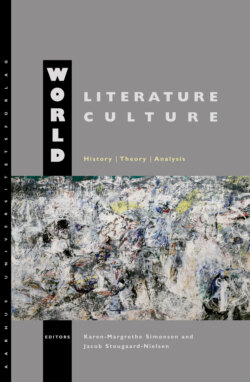Читать книгу World Literature, World Culture - Группа авторов - Страница 20
На сайте Литреса книга снята с продажи.
WORKS CITED
ОглавлениеActa Comparationis Litterarum Universarum [ACLV], NS.
Burckhardt, Jacob. Reflections on History. Trans. M.D. Hottinger. Indianapolis: Liberty Classics, 1979.
Damrosch, David. “Rebirth of a Discipline: The Global Origins of Comparative Studies.” Comparative Critical Studies 3 (2006): 99-112.
Ferris, David. “Indiscipline.” Comparative Literature in an Age of Globalization. Ed. Haun Saussy. Baltimore: Johns Hopkins UP, 2006: 78-100.
Gumbrecht, Hans Ulrich. “The Future of Literary Studies.” The Future of Literary Studies. Eds. Hans Ulrich Gumbrecht and Walter Moser. Canadian Comparative Literature Association, 2001.
Hegel, Georg Wilhelm Friedrich. The Philosophy of History. Trans. John Sibree. Kitchener: Batoche Books, 2001.
Meltzl de Lomnitz, Hugo. “Present Tasks of Comparative Literature.” Comparative Literature: The Early Years. An Anthology of Essays. Eds. Hans-Joachim Schulz and Phillip H. Rhein. Chapel Hill: U of North Carolina P, 1973.
Rorty, Richard. “Looking Back at Literary Theory.” Comparative Literature in an Age of Globalization. Ed. Haun Saussy. Baltimore: Johns Hopkins UP, 2006: 63-68.
Saussy, Haun. ed. Comparative Literature in an Age of Globalization. Baltimore: Johns Hopkins UP, 2006.
______. “Exquisite Cadavers Stitched from Fresh Nightmares: Of Memes, Hives, and Selfish Genes.” Comparative Literature in an Age of Globalization. Ed. Haun Saussy. Baltimore: Johns Hopkins UP, 2006: 3-42.
1 I would like to express my gratitude to Professor Damrosch for allowing me to read the manuscript version of his essay.
2 Among others, Nietzsche might have heard about Petőfi from Meltzl.
3 Theories about Petőfi’s death as well as the location of his corpse also appeared on the pages of Meltzl’s journal; one reader, writing about Petőfi’s death at Segesvár, notes that while Goethe was dreaming about Weltliteratur, Petőfi was dreaming about world-freedom, but he also died for it (ACLV XIII, 1-2: 25-26).
4 Here I rely on Hans Ulrich Gumbrecht’s argument in “The Future of Literary Studies,” although I take responsibility for the statement that literary studies survived their own death.
5 The fascination, it seems, was mutual: Derrida was perplexed by what he considered the apocalypticism of America. Derrida’s fascination with the apocalyptic in the U.S. is visible from his work on the rhetoric of nuclear politics as well as his essay on Kant’s critique of apocalypticism.
6 I am aware of the anachronistic connotations of these terms here. I merely want to indicate that whatever we understand by “cosmo-,” its genesis and logos will always be self-containing, unified, coherent in itself. We may call them, therefore, metaphysics, and if my argument requires the identification of any philosophy with metaphysics, I am more willing to accept this consequence than to give up the thesis of unity and coherence.
7 Many of the philosophies appropriated in this way were indeed theories of language, signs, even reading. Deconstruction, to mention the most obvious, is undoubtedly a theory (or in any case also a theory) of signification and signs, and as such it constitutes an important challenge to all other theories of meaning that are explicitly or implicitly based on hermeneutics. Yet even in this case there is a considerable gap between a complex theory of how meaning emerges and the actual analyses of texts, and this gap has only rarely been successfully bridged by anything other than political and ideological considerations.
8 “We shall make no attempt at system, nor lay any claim to ‘historical principles.’ On the contrary, we shall confine ourselves to observation, taking transverse sections of history in as many directions as possible. Above all, we have nothing to do with the philosophy of history” (Burckhardt 32).
9 “In this science it would seem as if Thought must be subordinate to what is given, to the realities of fact; that this is its basis and guide: while Philosophy dwells in the region of self-produced ideas, without reference to actuality … But as it is the business of history simply to adopt into its records what is and has been – actual occurrences and transactions; and since it remains true to its character in proportion as it strictly adheres to its data, we seem to have in Philosophy, a process diametrically opposed to that of the historiographer. This contradiction, and the charge consequently brought against speculation, shall be explained and confuted” (Hegel 22).
